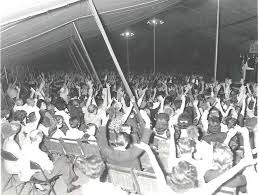As I said in my last installment, one of the memebers of our class grew up in a time and a place of sultry summer tent revivals.


His particular pastor would open the well-worn covers of his Good Book to the golden words of John the Divine and decipher the events of the world. Growing up in the Midwest during the Commie scare with Ike at the helm and heavy ply-wood desks as the only barrier between school kids and whatever nuclear warhead the Soviets had trained on Middle America, the USSR was, without question, the beast. Hellfire and brimstone from the pulpit to compliment the imminent hellfire from the skies. Soon after the recent Armageddon, he and his wife began reading Revelation again.
The first day of the study I let the class know that I think that all end of times readings of the book are little more than bizarro misreadings that fundamentally do violence to the text by reading it in a way it was never meant to be read… that despite the claim to be a literal reading of the book, thus more respectful and faithful, are anything but because to read a metaphor as literal is to not understand the metaphor, thus actually disrespectful and unfaithful. Strangely, despite that statement, they still ask me to pin the tail on the Beast for them. Just this past Sunday, I was asked: “Ok, I know you say you don’t believe that this literal but, do you think that there really are 144,000 saints and when do you think that they will be sealed?”
This was asked by a lady who had spent three weeks in France. Yes, she and her husband (I think she’s a food writer, I don’t know what he does) make enough money to spend three weeks in France renting a cottage in the same village as Johnny Depp and drinking French reds that would bleed my wallet dry. Yet, a literal reading of the book is what they know. And it’s really more literal reading by cultural osmosis. At some point, after they got religion, which was after they got married in their late 20s, early 30s, they accepted that Jack van Impe’s version was real. He, for the curious, applies his Bible expertise to interpret the news story from his apocalyptic point-of-view to indicate that the Rapture, Armageddon, and the Second Coming will soon occur.
(But, back to the other guy.) One of the study aids I provide are quotes from the 5 or 6 commentaries I’ve been reading to do this study. Things like these two rather innocuous quotes…
Revelation is a book about justice and God’s sovereignty even in the face of great evil loose on the world. And it is difficult to convince the church that it has been complicit with structural and governmental systems that have perpetrated great evils on many people… How does one deal with complacency, lack of zeal, self-centered behavior, and, most of all, too much accommodation to the secular culture outside the church?
The Christians in John’s churches were not simple peasant people of the back country; they resided in the principal cities of their time, struggling with the issues of how the Christian witness could be made real and viable within the political and cultural life of a sophisticated urban population.
Regarding these two quotes and two that gave some historical background but attempted no interpretation of the text, the guy (who leans politically left and would agree with these quotes wholeheartedly had they not been about Revelation) informed me that he thought this type of reading (one that tried to place it in its historical context and read it from there) was much more difficult than the one he’d grown up with… the one where the Beast had transmogrified from Hitler, to Kruschev, to Saddam.
I would’ve understood his response had he been reacting to a quote like this one:
Revelation’s mythological rhetoric represents the repulsive and grotesque powers of Satan and the abyss in order to shock the audience to repent of idolatry and to reject completely destructive powers.
Or, one that uses words like soteriology, eschatology… But, the quotes he was struggling with were quotes that were utterly reconcilable to his futuristic, bizarro reading. In fact, I don’t think he was struggling with the quotes, but with my disbelief.
Truth be told, he is absolutely right. It is much harder to read respecting the past than to read enamoured by present concerns… and, in fact, we can never circumvent the present and never fully reconstruct the past. Neither Chronos nor Babel can be escaped.
His point, though, had nothing to do with hermeneutical skepticism. Instead, it was all about hermeneutical comfort. It’s much easier, even if we don’t like the end result, to read the way we’ve always read. Especially when this mode of reading is sold to us as the way Christians read. (Indeed, he had to sign a document to graduate from college saying he was pre-trib, premillenial.) What this amounts to is a bunch of people perpetuating a way of reading only because they think that this is the way Christians read. Case in point, the food writer—who in every other aspect of her life is, I assume, a rather rational, largely secular, human being.
it’s late, i’m tired, it’s the end of the semester, we are off to a wedding in austin tomorrow. best to all.
